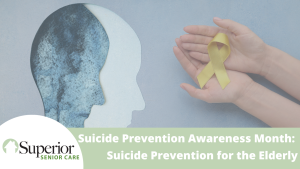
Suicide is an often stigmatized subject that makes many people uncomfortable to talk about. Many people don’t even discuss mental health issues with others. That’s why the National Alliance on Mental Illness (NAMI) has worked to make September National Suicide Prevention Awareness Month. It’s important to discuss and bring attention to mental health and suicide prevention, especially in the elderly. According to the Centers for Disease Control and Prevention (CDC), although older adults make up 12% of the overall population, they make up 18% of people who die by suicide with men over 85 years old having the highest suicide rate in the US.
Why are the elderly at a high risk for suicide?
Life circumstances that lead to isolation or loneliness are huge risk factors for seniors. Living alone, no longer able to drive, the loss of a spouse, and mobility limitation are some reasons that elderly people may feel like they no longer want to live. These factors can also lead to mental health problems like depression. And the stigma of discussing mental health with others may in turn make the struggling elderly adult feel more isolated. Also they are less likely to seek out help, professionally or from friends or family. Financial problems, substances abuse, and a family history of suicide are other possible risk factors. Additionally, many elderly people have easier access to firearms or dangerous medications.
How to Prevent Suicide and Save Elderly Lives
According to the Substance Abuse and Mental Health Services Administration, the biggest key to preventing suicide among the elderly is to make sure that they have access to medical professionals they can discuss their mental health issues with as well as substance abuse concerns. It also helps if they have people or a community they feel connected to and supported by. And a reason to live such as family, friends, or pets.
How Home Care Can Help Prevent Suicide in the Elderly
Having an in-home health care provider can significantly help reduce feelings of isolation and loneliness, especially if friends and family are unable to make frequent visits. A caregiver can also help with medication administration, reminders, and refills for clients with mental health issues who need to stay on their medication to stay mentally stable. And they can also help with activities of daily living like bathing and grooming that can improve a senior’s mental health.
IF YOU, A FAMILY MEMBER, OR LOVED ONE IS HAVING SUICIDAL THOUGHTS, PLEASE CALL THE NATIONAL SUICIDE PREVENTION LIFELINE AT (800) 273-8255 (TALK), 988 or call 911.
PLEASE NOTE: A threat or attempt at suicide is a medical emergency and requires professional help. Contact help as soon as possible.
Are you looking for In-Home Care for the Elderly to Support Seniors, Caregivers and Families in Arkansas?
Superior Senior Care is Arkansas’s oldest, most trusted name in in-home care services. We prioritize your peace of mind. We offer referrals for a variety of levels of elderly care and services, with both short and long-term options. All the senior caregivers on our registry undergo thorough screenings and comprehensive background checks. And they are trained to work with clients in everything from household duties to grocery shopping. We’ve helped families with a variety of chronic conditions including dementia, Alzheimer’s disease, arthritis, Parkinson’s disease, lung disease and more.
For more information on our home health services offering, please contact us today at (888) 503-5879 or visit our website at https://www.superiorseniorcare.com/our-services/
As the first accredited registry in Arkansas, we have more than 35 years of experience and thousands of happy customers. Access to our large client registry means stability for you and the best chance to match you with just the right family. Interested in becoming a caregiver on our registry? Fill out and electronically submit our pre-screening referral application here: https://www.superiorseniorcare.com/caregiving-opportunities/
References:
https://www.cdc.gov/suicide/factors/index.html
https://www.nami.org/Home
https://www.samhsa.gov/

Add Comment